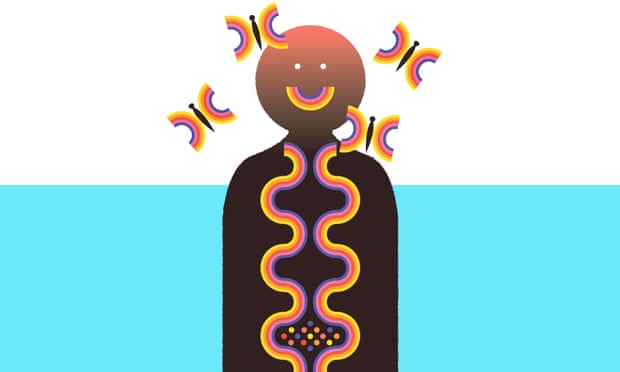
Scott Anderson
Follow
The Psychobiotic Revolution: Mood, Food and the New Science of the Gut-Brain Connection Hardcover – 15 November 2017
by Scott C. Anderson (Author), John F. Cryan (Author), & 1 more
4.6 out of 5 stars 660 ratings
See all formats and editions
==
Written by the leading researchers in the field, this information-rich guide to improving your mood explains how gut health drives psychological well-being, and how depression and anxiety can be relieved by adjusting your intestinal bacteria.
This groundbreaking book explains the revolutionary new science of psychobiotics and the discovery that your brain health and state of mind are intimately connected to your microbiome, that four-pound population of microbes living inside your intestines. Leading medical researchers John F. Cryan and Ted Dinan, working with veteran journalist Scott C. Anderson, explain how common mental health problems, particularly depression and anxiety, can be improved by caring for the intestinal microbiome. Science is proving that a healthy gut means a healthy mind-and this book details the steps you can take to change your mood and improve your life by nurturing your microbiome.
==
Print length
320 pages
National Geographic (US)
====
Product description
Review
"More questions about gut, human health and disease? Try [The Psychobiotic Revolution]"
-Psychology Today
"This is an accessible guide for a lay audience on science that could radically alter the understanding of anxiety and depression, along with a host of other conditions." -Publishers Weekly
"...I recommend reading The Psychobiotic Revolution by Scott C. Anderson." -Forbes.com
"Although decidedly aimed at the lay reader, the tone throughout is very humorous; I found myself swiftly turning pages, excitedly anticipating the next witty joke. Overall, this is a great book that encourages you to 'take charge of your gut to optimize your mind and your mood'. This is a book that you would reluctantly lend to friends, in the fear that they might not return it." -Lancet
"The hope is that it may one day be possible to diagnose some brain diseases and mental health problems by analysing gut bacteria, and to treat them - or at least augment the effects of drug treatments - with specific bacteria. Cryan and his colleague Ted Dinan call these mood-altering germs "psychobiotics", and have co-written a book with the American science writer Scott C Anderson called The Psychobiotic Revolution." --The Guardian
"The Psychobiotic Revolution could change how you think." --sultanabun.com
"The authors of The Psychobiotic Revolution present clear research that we are indeed what we eat and that our lives would be much more enjoyable if we could balance our gut health in order to balance the rest of us." --Peppermint PhD. blog
"This book is written for a lay person. It does a very good job of explaining some difficult concepts in a way that will be easily understood by people who don't have any biology background without dumbing the subject matter down so much that people with more knowledge would cringe as they read it. That's a fine line to walk." -Spirit blog
"Many of my burning questions were answered in a simple and succinct way that makes the battle to improve our health and diet much more feasible." -Jathan & Heather blog
"Packed with the latest scientific research, [the book] informs and fascinates" -Literary Quicksand blog
"The authors have combined all the most significant information and then gleaned out the important issues that the reader needs to know in an extremely easy to read book, which becomes a real page-turner. This short book certainly relates to "You are what you Eat!" -Patricia's Wisdom blog
"This authoritative yet engaging book provides up-to-the minute research and practical advice on the gut-brain axis, perhaps the most exciting area of science today. Written by some of the leaders in the field, it gives terrific insight into what is going on in the gut, how to change it to improve mood, and the largely unappreciated links between mental health and the many other diseases now linked to the gut microbiome."
--Rob Knight, Director of the Center for Microbiome Innovation, University of California at San Diego, author of Follow Your Gut and coauthor of Dirt is Good
"Anderson, Cryan and Dinan have infused life into cutting edge research that is often still mired in the scientific language.... The authors take on a near impossible task, to translate 150 years of research into the infinite complexity of human behavior and make it digestible. Compelling, engaging and informative, this book teaches us why microbes may affect all of our decisions.... This is brain food!"
====
About the Author
SCOTT C. ANDERSON is a veteran science journalist with specialization in medical topics and computer programming. He was one of the creators of Lego Island, a computer game, and his work has combined computer programming with medical research. He runs a laboratory called Freedom Health that studies bacterial health in racehorses and has developed prebiotics for animals and humans. He lives in Hudson, Ohio (between Cleveland and Akron), was born in Frankfurt, Germany, and recently lived in Sonoma, California.
JOHN F. CRYAN is professor and chair of the department of Anatomy & Neuroscience, University College Cork. A principal investigator in the Alimentary Pharmabiotic Centre, a leading-edge institute researching the role of microbiome in health and disease, he lives in Cork, Ireland.
TED DINAN is professor of psychiatry and a principal investigator in the Alimentary Pharmabiotic Centre at University College Cork. He was previously chair of clinical neurosciences and professor of psychological medicine at St. Bartholomew's Hospital, London. He lives in Cork, Ireland.
- "The community of microbes living in your gut--your so-called microbiota--is like another organ of your body. It's a seething alien living inside you, fermenting your food and jealously protecting you against interlopers. It's a pretty unusual organ by any measure, but even more so in that its composition changes with every meal.
- "It's not just made of bacteria. Your microbiota is also home to ancient life-forms related to the colorful creatures that tint hot springs, called Archaea. It includes the kings of fermentation, the yeast. It hosts swimming single-celled protozoans, constantly on the prowl. It also includes an even more insane number of viruses, as small relative to bacteria as bacteria are to human cells. Your gut microbiota is spectacularly cosmopolitan, making it a challenging beast to study.
- "Your microbiota communicates directly with your second brain, a phrase coined by Michael Gershon in 1998 to refer to the network of nerves surrounding your gut. A good set of microbes encourages this second brain to keep the feast moving. For good health, including mental health, the food you eat needs to be good for you and for your microbiota ... including what we now call psychobiotics." ...
- "Research keeps unearthing connections between seemingly unrelated gut and brain diseases. What do skin diseases like psoriasis and eczema have to do with brain problems like multiple sclerosis (MS)? The surprising connection is the gut microbiota. Even seemingly intractable conditions like autism may be improved with psychobiotics. Normal social bonding may depend on a healthy gut."
- ... "We underestimate these tiny creatures at our peril. So-called single-celled bacteria can in fact form great citylike complexes composed of several different species living harmoniously in a biofilm. It sounds exotic, but you step on biofilms every time you walk over a lichen-covered rock. The biofilms in and on your body are related to lichen, and share their features of resilience and togetherness.
- "Biofilms are marvelously complex. They have pores for pumping nutrients, acting as a basic circulatory system. They maintain a protective coating--a primitive skin--that holds water in. The various species communicate with each other, using signaling molecules, including neurotransmitters ... they have in essence become a hardy, multicellular organism.
- "The biofilms are everywhere, from your mouth down to your anus. In your mouth, you might know it as plaque. In your intestines, a pathogenic biofilm might be behind Crohn's disease. These biofilms are unavoidable. Fortunately, you can put them on your payroll. ... Properly established, a compatible biofilm can lead to a lifetime of gastronomic bliss, unburdened by inflammation and its frequent companions, depression and anxiety.
- "A microbiota that is unbalanced and that provokes an immune response is called dysbiotic. It can lead to inflammation, which is a significant contributor to depression and anxiety. Worse yet, it is a major predictor of mental decline ..."
- ... "The first theories about the gut-brain connection go back to the 18th-century French anatomist Marie Francois Xavier Bichat, who discovered that the gut has its own nervous system, independent of the central nervous system. It isn't organized in a lump like the brain but rather as an intricate double-layered lacework surrounding your entire gut like a tube sock. Bichat also, far ahead of his time, saw the connection between emotion and the gut, and situated the passions in the 'epigastric center,'as he called it. At the end of the 20th century, the concept was dusted off and better defined by Michael Gershon, who dubbed the intestinal nervous system the 'second brain' in a book with the same name."
- ... "At the beginning of the 20th century, a French pediatrician named Henri Tissier ... discovered that babies fed on mother's milk had a population of unique microbes he called Bifidobacteria ...
- "Tissier ... had two experimental groups of babies: bottle-fed and breast-fed. In the poop of children reared on cow's milk, Tissier didn't find Bifidobacteria. These babies were also not as healthy ... in fact, bottle-fed babies at that time were dying at seven times the rate of breast-fed babies." ...
- "We are going to be talking enough about Bifidobacteria that we can nickname it Bifido. ...
- "Tissier couldn't know that Bifido, along with other microbes, were not only helping with digestion but were also educating the baby's immune system. Without that basic education the immune system can mistakenly attack beneficial bacteria and even the baby's own cells. That can lead to inflammation and may plant the seed for depression and anxiety as the baby grows. Depression and anxiety can have many roots, but this one may start to grow even before the baby is born."
- ... "Bercik also tried fecal transplants between mice with specific behavioral traits and found that some of those traits transferred with the feces. When they took feces from an exploratory mouse and transferred it into a timid mouse, exploratory behavior transferred, too." ...
- "When you wake up craving a doughnut, where do you think that idea came from? Your cravings are often just committee memos sent up from your gut microbes. They contain a complete list of the carbs, sugars, and fats they are looking for.
- "Here's an example of how that works. Some microbes, especially our friendly Bifido species, produce butyrate, which feeds and heals the lining of your gut. Butyrate can make its way to the brain, where it can induce a good mood, dampen inflammation, or encourage the production of a brain-growth hormone."
- "Your Bifido thrive on the fiber in your diet. If you feed them fiber and find your mood improving, over time you will start to yearn for the fiber that makes you feel good. That is a simple Pavlovian way to create a craving. Your Bifido has conditioned you to feed it." ...
- "Cravings undergo a major change in people who have gotten a stomach bypass to lose weight. They have a completely different microbiota and brand-new cravings. In fact, much of the weight loss attributed to a smaller stomach is actually due to other factors, including changing tastes. Studies are starting to indicate that much may be due to the altered microbiota." ...
- "Our cravings seem like an integral part of our psyche ... But when you think of your cravings as microbial longings, it may be easier for you to take back control." ...


